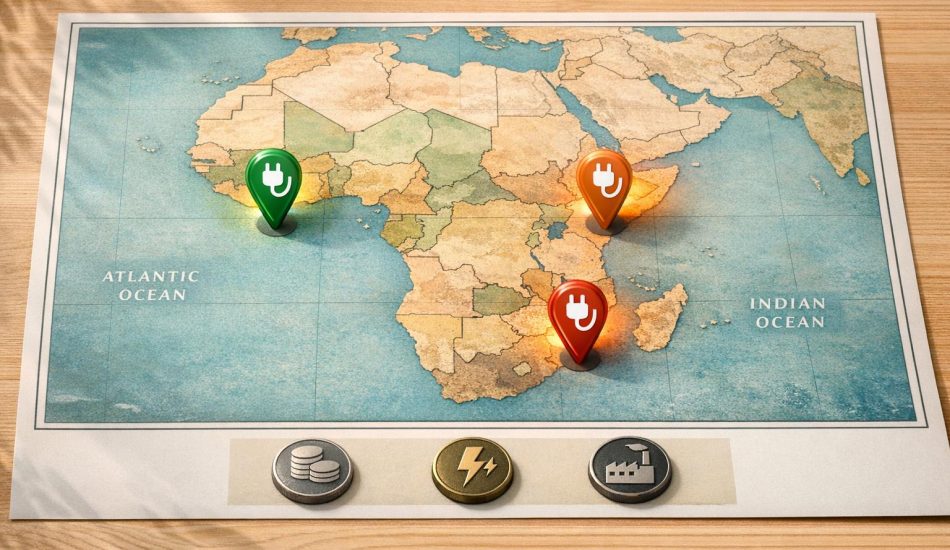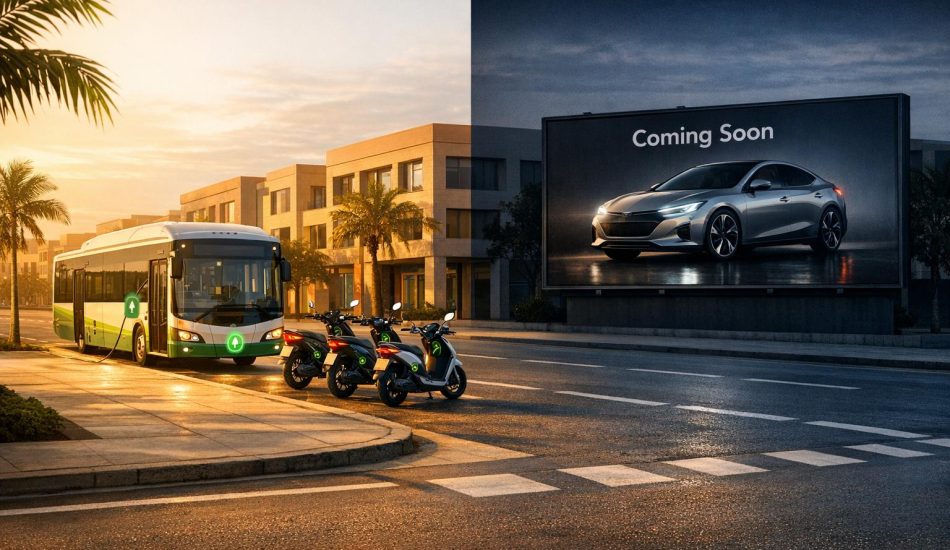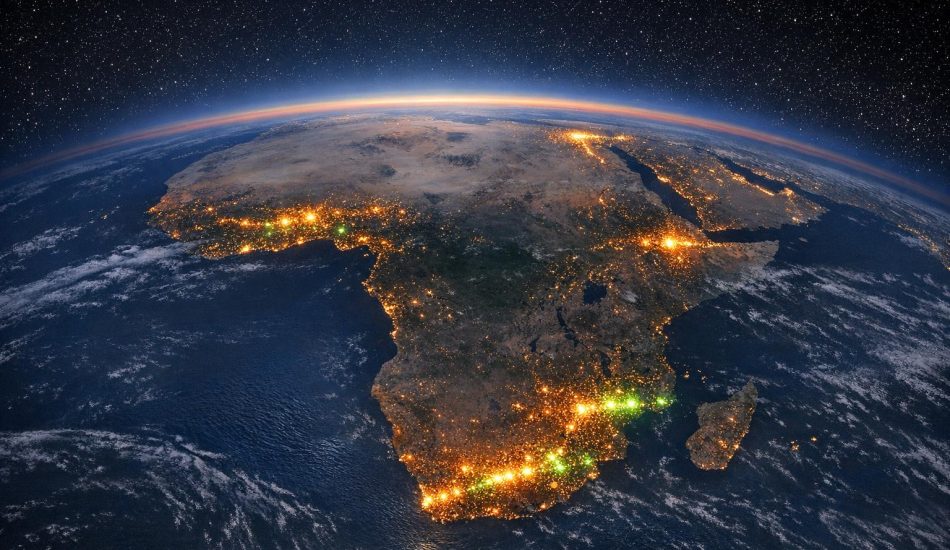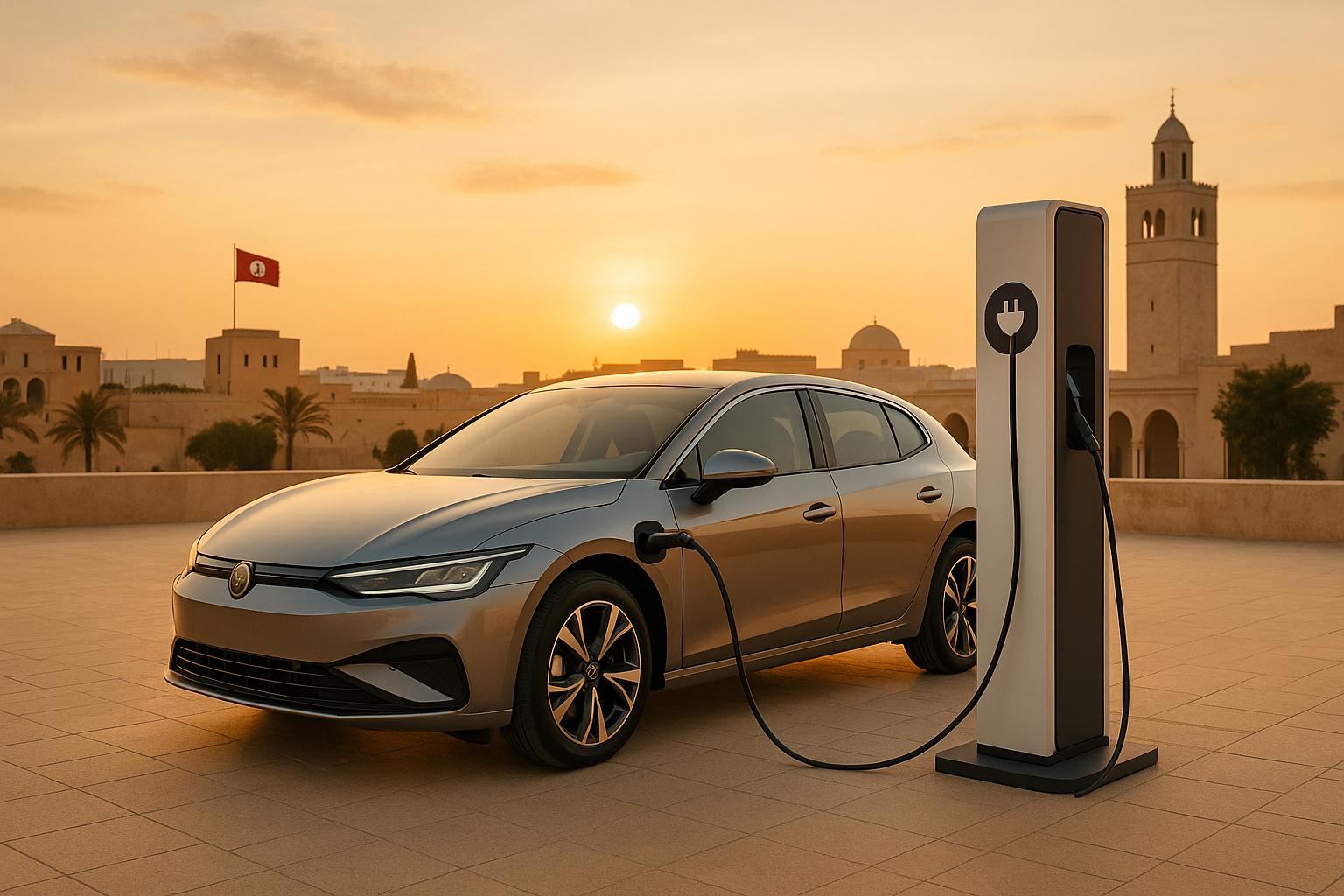
Tunisia’s electric vehicle (EV) market is growing fast in 2025, driven by government incentives and increasing consumer interest. The market now offers a range of options, from budget-friendly EVs to luxury models, with brands like Hyundai, BYD, Tesla, and XPENG leading the charge. Key highlights include:
- Government Support: Reduced VAT, lower customs duties, and policies promoting EV charging infrastructure are boosting adoption.
- Charging Network: Around 500 charging points are available, with plans to expand to 5,000 by 2030.
- Top Models: Hyundai leads with strong sales, followed by BYD (Tang, Dolphin) and new entrant XPENG (AI-driven features).
- Pricing: New EVs are expensive due to import fees, but used EVs provide affordable alternatives. Prices range from $5,880 (GEELY PANDA MINI BASE) to $40,090 (LEAPMOTOR C01).
- Buying Process: Platforms like EV24.africa simplify purchasing, financing, and delivery.
Whether you’re buying new or used, it’s essential to consider costs, charging needs, and vehicle range. This guide covers everything you need to know for a smooth EV purchase in Tunisia.
BYD Launches Five Vehicles in Tunisia: Three EVs and Two PHEVs
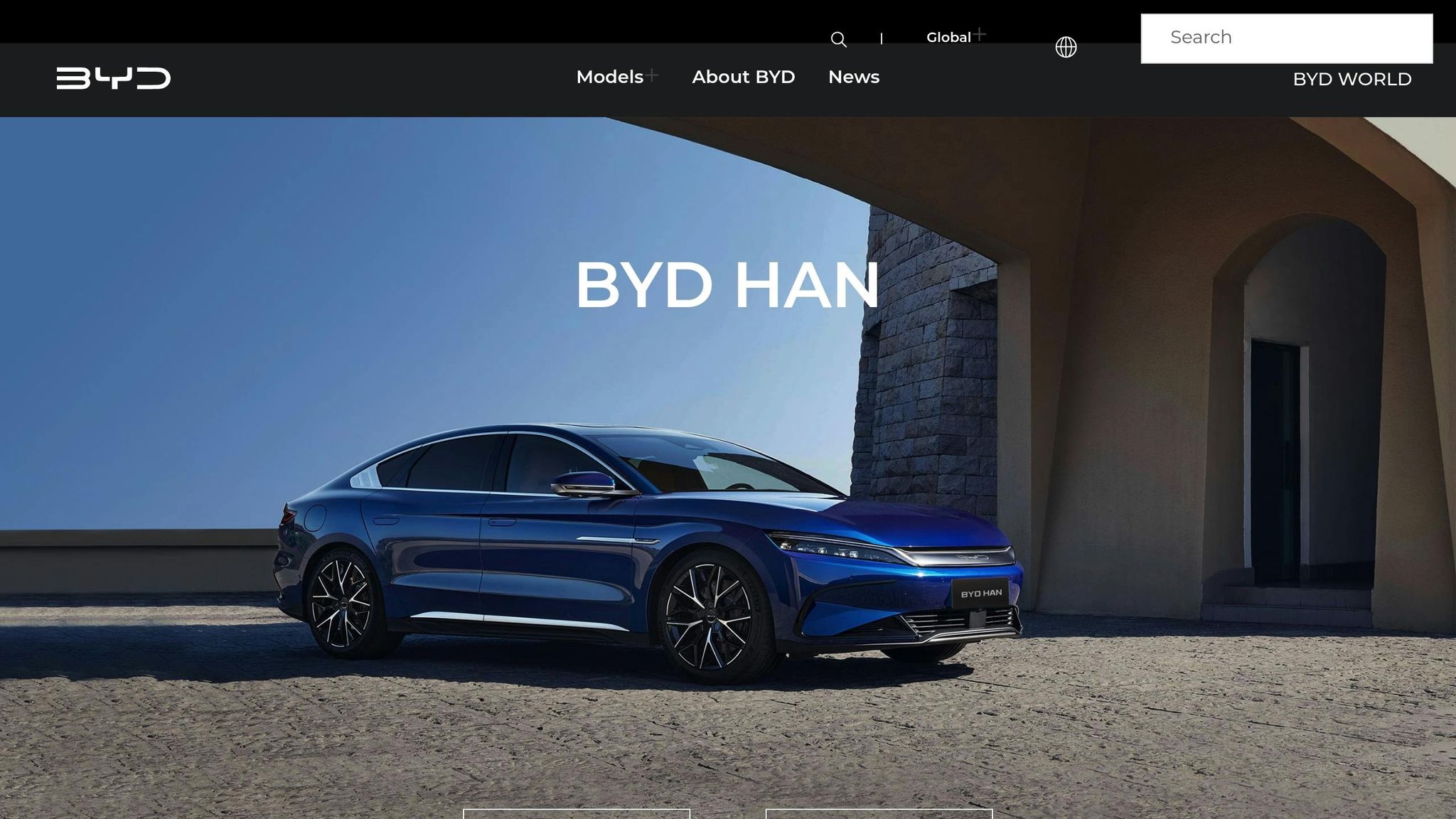
Electric Car Market in Tunisia 2025
Tunisia’s electric vehicle (EV) market is steadily gaining traction in 2025. The country now has 500 electric vehicles and an equal number of charging points. This development is part of a broader national strategy aiming for 50,000 EVs and 5,000 charging stations by 2030. Although EV adoption remains modest compared to international benchmarks, the one-to-one ratio of vehicles to charging points highlights the government’s focus on laying a solid foundation for growth. These early steps are paving the way for forward-thinking policies to support the sector’s expansion.
Government Policies and Incentives
The Tunisian government is taking deliberate steps to nurture the EV market. In July 2025, it initiated a public consultation to establish clear guidelines for EV charging infrastructure. This framework addresses essential aspects like technical standards, safety protocols, licensing requirements, and pricing structures. One notable policy allows charging station operators to set their own prices, encouraging competitive rates. Additionally, updated regulations now permit gas stations to install EV chargers, giving fuel retailers a chance to diversify their offerings. To further bolster the EV ecosystem, the government is actively promoting investments in renewable energy to ensure sustainable power sources for charging stations. These policies are crucial for achieving the ambitious growth targets outlined in Tunisia’s national strategy.
Charging Infrastructure and Availability
As of 2025, Tunisia’s charging network is still in its infancy, with approximately 500 charging points spread across the country. Urban areas have the highest concentration of these facilities, while rural regions remain underserved. According to Electromaps, a platform for locating charging stations, Tunisia currently lists only one station in its database, located in El Mourouj. The most recent addition to the network was a Shell charging station in Ben Arous, installed on August 3, 2023. The government has set its sights on expanding this network to 5,000 charging points by 2030. Building out this infrastructure will be essential for the EV market’s continued growth and accessibility.
Available Electric Car Models in Tunisia
The electric vehicle (EV) market in Tunisia is on a fast upward trajectory, with sales jumping an impressive 88.6% in the first half of 2025. This growth has pushed automakers to develop features tailored to Tunisian drivers’ needs and preferences. Currently, three brands dominate the scene: Hyundai, which leads the market with a staggering 102.7% sales increase in H1 2025, followed by BYD and DongFeng.
BYD made a bold entry into the Tunisian market in July 2024, introducing five new energy vehicle models. Building on this momentum, XPENG officially joined the market on September 4, 2025, through a partnership with XP CARS Tunisia. With such rapid developments, let’s explore the standout models shaping Tunisia’s EV market.
Top Models and Their Features
Hyundai holds the top spot in Tunisia’s EV market, offering a range of dependable electric vehicles. Its strong dealer network and reliable after-sales service make it a favorite among buyers looking for trustworthy electric transportation.
BYD has quickly gained traction since its 2024 launch. The brand’s lineup includes the mid-size SUV Tang, the compact hatchback Dolphin, and the Yuan PLUS (locally known as ATTO 3). They also offer plug-in hybrids like the Destroyer 05 (BYD KING) and the Song PLUS DM-i, which features a marine-inspired design and advanced DM-i hybrid technology.
DongFeng has cemented itself as the third major player by delivering practical and accessible EV options tailored to local needs.
XPENG, the newest entrant, brings cutting-edge AI-driven mobility features to Tunisia. While the specific models for the Tunisian market haven’t been announced yet, XPENG’s global lineup includes the X9, G9, G6, and P7. The company aims to offer a "green and smart mobility experience" to African consumers. Its credibility is bolstered by winning the "2025 Electric Vehicle of the Year" award at the 7th Egyptian Annual Auto Awards in July 2025. XPENG’s expansion into Tunisia and Morocco strengthens its presence along North Africa’s coastal economic belt, complementing its operations in Egypt.
EV Model Comparison Table
| Brand | Popular Models | Type | Key Features | Market Position |
|---|---|---|---|---|
| Hyundai | Various EV lineup | BEV | Strong dealer network and reliable service | Market leader (102.7% growth H1 2025) |
| BYD | Tang, Dolphin, Yuan PLUS, Destroyer 05, Song PLUS DM-i | BEV/PHEV | Marine-inspired design, DM-i hybrid tech | Second place |
| DongFeng | Multiple models | BEV | Practical and affordable EV options | Third place |
| XPENG | X9, G9, G6, P7 | BEV | AI-driven tech and advanced driver assistance | New entrant (Sept 2025) |
The Tunisian market shows a clear preference for SUVs and compact vehicles, with models like the BYD Tang and Yuan PLUS standing out for their spacious designs. Hybrid options, such as the BYD Song PLUS DM-i, appeal to those seeking the flexibility of combining electric and traditional powertrains.
For buyers exploring the Tunisian EV landscape, platforms like EV24.africa offer a broad selection of options across various price ranges and vehicle categories, ensuring something for everyone.
Electric Car Prices in Tunisia
Tunisia’s electric vehicle (EV) market is shaped by a mix of import costs, government initiatives, and economic conditions. Despite an impressive 88.6% growth in the first half of 2025, the country’s EV adoption rate remains one of the lowest in North Africa, primarily due to pricing hurdles. Pricing transparency is also a challenge, making it essential for buyers to research thoroughly before making a purchase. Here’s a closer look at the current pricing trends and what influences them.
New and Used EV Prices
Electric vehicle prices in Tunisia vary depending on whether you’re looking at new or used models, as well as the brand and model.
- New electric vehicles come with higher price tags, largely due to import duties and limited local production. Brands like Hyundai, BYD, and DongFeng dominate the market, offering models across different price points. However, factors such as dealership availability and import fees can cause noticeable price fluctuations.
- Used electric vehicles are becoming a more popular choice in Tunisia. With limited production and inflation driving up costs, the demand for second-hand EVs has grown. For buyers exploring a more affordable way to switch to electric, this market provides a viable option.
Platforms like EV24.africa are helping buyers by listing prices for both new and used EVs, complete with specifications and financing options, making it easier to compare and decide.
Factors Affecting Prices
Several elements play a role in shaping EV prices in Tunisia:
- Import costs and duties: Since most EVs are imported, factors like currency fluctuations, shipping fees, and customs duties heavily influence retail prices.
- Government policies: Tunisia has introduced subsidies aimed at replacing older vehicles and is working on a long-term development plan for the EV industry. These efforts help reduce some of the financial barriers tied to imports, making EVs slightly more accessible.
- Economic conditions: Tunisia’s economy is expected to grow by 1.9% in 2025, with inflation dropping to 5.6% as of April 2025. The Central Bank’s decision to lower its key interest rate to 7.5% could also make financing EV purchases more manageable.
- Lower operational costs: EVs typically have fewer moving parts, leading to reduced maintenance costs. Features like regenerative braking and lower emissions-based taxes further contribute to long-term savings.
- Supply chain logistics: Brands with less-developed distribution networks often face pricing inconsistencies, whereas those with established systems tend to offer more stable pricing.
Financing Options for Buyers
Details on financing remain somewhat limited, but competitive financing options are becoming increasingly important for buyers. As the market evolves, consulting local dealers and financial institutions can provide up-to-date financing packages tailored to individual needs.
sbb-itb-99e19e3
EV Delivery and Purchase Process
Buying an electric vehicle (EV) in Tunisia has become easier, thanks to online platforms simplifying the process.
How to Buy an EV
Start by visiting EV24.africa, where you can explore a variety of new and used EVs. Use filters to narrow down your options based on budget, brand, or specific features. If you’re considering a used EV, reach out to the seller to get details about its condition and maintenance history. Once you’ve agreed on the terms, you can complete the transaction securely through EV24.africa’s system, which also provides financing options. Afterward, take delivery timelines into account to ensure your purchase fits your schedule.
Delivery Options and Times
For local purchases, EV24.africa works with logistics partners to handle delivery. If you’re importing a vehicle, be aware that additional processing might extend the delivery timeline. The platform provides estimated delivery times and outlines any associated costs, so you can plan accordingly. Make sure to review all necessary documentation to avoid delays.
Required Documents and Support
You’ll need standard local documents and payment verification for vehicle registration, especially if you’re using financing. If you have any questions along the way, EV24.africa’s customer support team is ready to assist and guide you through the process.
Buying Tips for EV Buyers in Tunisia
When considering an electric vehicle (EV) in Tunisia, your decision will likely revolve around factors like cost, maintenance, charging options, and the vehicle’s history. Here’s a breakdown to guide you:
Cost and Maintenance
EVs can save you money on fuel since electricity is cheaper than gas, and they typically require less maintenance because they have fewer moving parts. However, their upfront cost is usually higher, and you should also factor in potential battery replacement expenses once the warranty expires. Routine maintenance for EVs includes tasks like tire rotations, brake inspections, and occasional system checks. Most EV batteries come with extended warranties, so take the time to review the warranty details – it’s a key part of your investment. Additionally, consider your charging needs and whether the vehicle’s range aligns with your daily routine.
Charging and Range Planning
Pick an EV that comfortably exceeds your daily mileage requirements. If you can, install a Level 2 home charger to handle both your regular commutes and any unexpected trips. For longer drives, it’s a good idea to familiarize yourself with public charging stations along your routes. Fast-charging stations can quickly recharge your battery, but planning your stops in advance will save you time and stress. Keep in mind that extreme weather conditions, like very hot or cold temperatures, can affect your EV’s range. Having a little extra range as a buffer can give you added peace of mind.
New vs. Used EVs: Pros and Cons
Whether you opt for a new or used EV depends on your budget, technology preferences, and concerns about warranties and battery health. Here’s a quick comparison:
| Factor | New EVs | Used EVs |
|---|---|---|
| Upfront Price | Higher initial cost | More budget-friendly |
| Warranty Coverage | Full manufacturer warranty, including battery | Limited or no remaining warranty |
| Technology | Latest features and faster charging | Older tech with potentially slower charging |
| Battery Health | Maximum capacity and lifespan | Possible battery wear and reduced capacity |
| Financing | Better financing options and incentives | May come with higher interest rates or fewer options |
| Availability | Delivery may take time | Ready for immediate purchase |
New EVs come with the advantage of full warranties and cutting-edge technology, which can be reassuring. On the other hand, used EVs are often more affordable but might carry uncertainties, especially regarding battery health and warranty coverage. If you’re leaning toward a used model, ask for a detailed battery health report and a complete charging history to make an informed decision.
Conclusion
Tunisia’s electric vehicle market in 2025 opens up exciting possibilities for those looking for affordable and reliable transportation options that are also environmentally friendly. Thanks to government incentives like VAT exemptions, reduced customs duties, and lower import fees, owning an EV is now more financially accessible than ever.
The market offers a wide range of choices, from budget models like the GEELY PANDA MINI BASE priced at $5,880 to high-end options such as the LEAPMOTOR C01 at $40,090, ensuring there’s something for every budget. EV24.africa simplifies the entire buying process by handling everything – vehicle sourcing, customs clearance, local registration, and delivery to the Port of Rades. Their transparent pricing and broad network, covering all 54 African countries, make EV ownership easier for residents across Tunisia.
Whether you’re eyeing a brand-new vehicle or a certified pre-owned model, it’s crucial to evaluate your driving habits and charging needs. With over 80% of EV charging typically done at home, setting up a home charger should be a top priority for a seamless transition to electric driving.
FAQs
What incentives does the Tunisian government offer for electric car buyers in 2025?
In 2025, the Tunisian government introduces a range of incentives to help make electric vehicles (EVs) more accessible. These include a $3,200 rebate, a lower VAT rate of 7%, and a 50% reduction on both registration fees and annual road taxes.
The goal is to boost EV adoption and assist Tunisia in shifting toward cleaner and more sustainable transportation options.
What is the current state of EV charging infrastructure in Tunisia, and how is it evolving?
Tunisia is making strides in building its electric vehicle (EV) charging network to accommodate the rising popularity of EVs. By 2025, the country plans to establish around 500 charging stations, with an ambitious goal of expanding that number to roughly 5,000 by 2030. This push is being fueled by a combination of government-led initiatives and private sector investments.
While the current number of publicly accessible charging stations is still relatively small, efforts are ramping up to prepare for future demand. Tunisia is also setting its sights on supporting 50,000 EVs by 2030, with an anticipated 50 MW of total charging capacity. These developments highlight Tunisia’s dedication to embracing electric mobility and reducing reliance on traditional fuel sources.
What should I consider when choosing between a new or used electric car in Tunisia?
When choosing between a new or used electric car in Tunisia, there are several important factors to consider. New EVs offer longer warranties, better battery performance, and cutting-edge technology, making them a dependable – though more expensive – choice. On the flip side, used EVs are easier on the wallet and still benefit from fewer mechanical issues compared to gas-powered cars. However, they often come with shorter warranties and may show some battery degradation, which can affect their range and lifespan.
To make the right choice, take the time to assess the battery’s condition, ensure the seller is trustworthy, and check for available warranties or service options in your region. These steps are particularly crucial in areas where EV infrastructure is still growing. By weighing these factors carefully, you can find the option that aligns with your budget and transportation needs.


